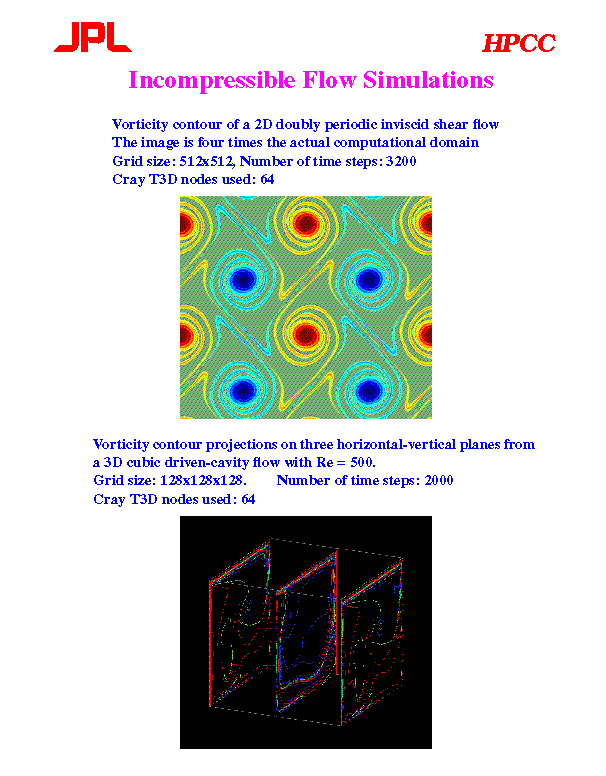Approach: The flow solver is based on a state-of-the-art incompressible Navier-Stokes algorithm - a second-order projection method, with a computationally efficient multigrid elliptic kernel. Staggered finite-difference grids are used in 2D and 3D implementations. A combination of Godunov and up-wind schemes is used in the discretization of convection terms to achieve both numerical stability and physics robustness for computing high Reynolds number and non-smooth flows. The strategy adopted in our implementation of the flow solver and the multigrid kernel is grid-partitioning on a hierarchy of fine and coarse grids with message-passings among neighboring subgrids. A message-passing interface is developed and included in the solver package to make it portable to parallel systems supporting MPI, PVM and Intel NX.
Accomplishments: The 2D and 3D flow solvers have been implemented together with their corresponding multigrid kernels. The 2D and 3D multigrid codes have been tested for proper convergence on test problems. The 2D flow solver was tried on a few test flow problems and satisfactory numerical results were obtained from these numerical experiments. The 3D flow solver was tested on a cubic driven-cavity flow and a steady-state flow can be reached with Reynolds number at 500. The parallel flow solver scales well on a 256-node Cray T3D at the Jet Propulsion Laboratory, and on a 512-node Intel Paragon at Caltech. This work was published in a paper with the same title as this page in the March, 1996 issue of The Journal of Computational Physics. The flow solver software has been packaged with a document page, and can be downloaded from our HPCC project web site: http://olympic.jpl.nasa.gov.
Significance: This is the first parallel implementation of a flow solver based on a second-order projection method with a parallel multigrid elliptic kernel. The numerical stability plus the numerical and parallel efficiency makes the code a promising research tool to the computational fluid dynamics community and other related science and engineering communities for complex flow simulations.
Status/Plans: Perform more numerical experiments on the 3D flow solver. Perform parallel performance optimizations on the solver package.
Point of contact: John Z. Lou, Jet Propulsion Laboratory, (818) 354-4870, lou@acadia.jpl.nasa.gov
